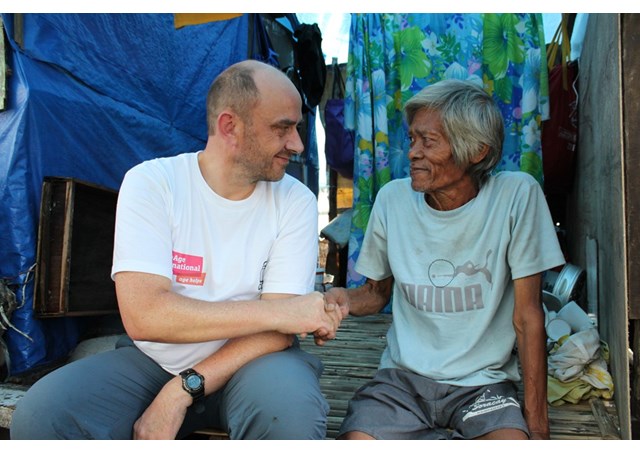
HelpAge Int: 'The WHS has failed vulnerable older people'

(Vatican Radio) This week's World Humanitarian Summit in Istanbul that aimed to reach all vulnerable people appears to have left some behind.
Notwithstanding the fact that one of the five “Core Responsibilities” at the heart of the Summit’s Agenda reads “Leave no one behind”, advocates for the rights of older people say between 10 and 20 percent of an aging world’s population has been let down.
Present at the Summit together with world leaders, NGOs, faith based groups and civil society involved in delivering humanitarian aid, was HelpAge International, the global network that helps older people claim their rights, challenge discrimination and overcome poverty, so that they can lead dignified, secure and healthy lives.
HelpAge was also actively engaged in the Summit’s preparatory process to try and ensure that the significance of global ageing and its implications for humanitarian action were taken into account.
Toby Porter, Executive Director of HelpAge International spoke to Vatican Radio’s Linda Bordoni on the final day of the Summit and explained that although a recently released report on the needs of older people who require humanitarian assistance had been presented, their voices have, yet again, been ignored.
“Our report, Toby Porter said, is called ‘Older voices in humanitarian action calling for change’ and the interviews were conducted with older men and women in probably the three worst humanitarian crises at the moment – the Syria crisis, the crisis in Ukraine, the crisis in South Sudan where there is a situation of conflict and drought at the same time.”
He explained that in each of these situations older people were asked what their situation was and whether they were satisfied with the standard of humanitarian assistance they were receiving.
They were also asked whether they were spoken to and whether they had been asked what their needs were.
“I’m afraid the picture (…) is one that should concern us all because it is a picture of neglect, a picture of exclusion” he said.
Amongst the main concerns of older people, Porter said, are those connected with health issues and diseases that are related to age, and being able to continue having access to their medicines.
Highlighting the fact that HelpAge applauds the concern of humanitarian actors to protect women, girls and children who are seen as the most vulnerable categories of society, he says that it is time to take older people into account as well.
“Older people are a very large group. Normally between 10% and 20% of an affected population could be expected to be aged 60 or more” he said.
He pointed out that the promise of humanitarian action is to reach the most vulnerable and it is time to take into account that there is a considerable group of vulnerable people out there that are being neglected.
“The promise of this summit is to ‘leave no one behind’, and what we’re saying is: ‘we have a problem here: for all the talk about leaving on one behind the evidence shows that older people are not routinely thought about” he said.
Porter explains that in the run-up to the Summit there was a consultation done during which participants were asked what they would like to see change in humanitarian action. One of the key promises that came out in the consultation document was “we must stop the continuing neglect of older people”.
Pointing out that the Summit was organized into Plenary Sessions and Round Tables involving the political leadership and the primary representatives of organizations, Porter said there was also a side-event city where agencies were allowed to make proposals to the UN for themes that they felt would be of particular interest.
“There were 15 side events that have in their title ‘children’, ‘youth’ or ‘young people’. How many were there for the aging? Zero! Did we make an application for a side event? Yes we did! Was it turned down? Yes it was!” he said.
Stressing the fact that it is a good and necessary thing to talk about education in emergencies and better protection for women and girls, Porter said that from a common sense point of view, from a purely demographic perspective, from a justice perspective, and from a human rights perspective: “to have no side events on older people at a World Humanitarian Summit when we are talking about a group that traditionally everybody admits, has not been well served” makes no sense at all.
“I don’t understand it; it seems to be perpetuating the same neglect.”
Porter concludes expressing his gratitude to Pope Francis whom, he says, has undoubtedly been the public figure over the past years who has done more than any other person alive to talk positively about old age.
“And also to be typically honest and uncompromising about what he sees as some of the changing attitudes and breakdown in societies’ values that have led to the neglect and abuse of older people” he said.
Tongue-in-cheek, Porter says: “we often say we must write to him and ask him to become an official ambassador for HelpAge International because he, more than anyone else, is out there saying all the right things, and feeling all the right things (…) he’s a great inspiration!”
For more information on the work of HelpAge International click here:
| All the contents on this site are copyrighted ©. |


